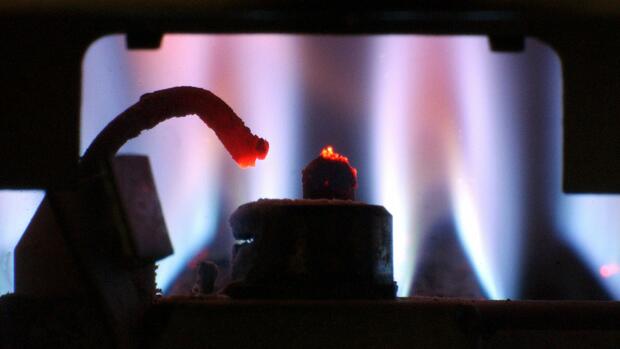Berlin Gas customers may have to prepare for higher prices again at the turn of the year. The reason: The Ministry of Finance wants to set a higher VAT on natural gas again sooner than expected.
If the providers pass this on in full, gas prices for private households will rise by around eleven percent in January, according to calculations by the comparison portal Verivox. For a model household with four people, this means additional costs of an average of 270 euros per year. Experts warn that this will hit gas customers hard in the middle of the heating season.
Because of the suddenly extremely high prices after the Russian attack on Ukraine, the federal government gave gas and district heating tax breaks last year. Originally, the lower VAT rate of seven instead of 19 percent was supposed to apply until March 2024.
Now, according to the wishes of Finance Minister Christian Lindner (FDP), the relief measure is to expire at the turn of the year, as the “Frankfurter Allgemeine Zeitung” first reported at the end of August. The shortening has not yet been decided. However, it should come to the table at the latest during the budget discussions in the Bundestag.
Why the crisis measure is expiring earlier
“The price peaks on the gas markets caused by the crisis have now subsided,” explained Lindner’s ministry. From the beginning, the tax cut was only intended as a short-term measure and never as a permanent measure. It could be ended early because the gas price fell faster than expected in 2022.
>> Read also: According to the study, gas price brakes cost much less than expected
Gas price
11
percent
German citizens will have to expect a jump in the price of gas heating as soon as the VAT increases again from seven to 19 percent. (Source: Verivox)
This is good news for the federal government, because the reduced VAT meant the state had less revenue. At the beginning, costs were expected to be around 11.3 billion euros. According to the Ministry of Finance, the federal, state and local governments are expected to save 2.1 billion euros due to the earlier end. This would create “leeway for public budgets,” as the ministry says.
What this means for consumers
Whatever the state saves, gas customers have to pay more – and that affects many private households. According to the energy industry association BDEW, almost half of the 43 million apartments and single-family homes were heated with natural gas in 2022. According to Verivox, on average their residents now have to expect a price jump of around eleven percent.
For a family of four that consumes 20,000 kilowatt hours of gas, this would mean additional costs of 270 euros per year. If you don’t have a gas contract yourself but use the basic supply, the price increase is even higher at 331 euros.
>> Read also: Strike in Australia drives up gas prices
According to Verivox, a couple with a consumption of 12,000 kilowatt hours has to pay an additional 170 euros on average, and 209 euros for basic services. Singles with a consumption of 5,000 kilowatt hours would have to expect an average cost increase of 71 euros (basic supply: 87 euros).
According to Verivox, the elimination of two surcharges, the so-called control energy surcharge and the conversion surcharge, will not offset the additional costs. In addition, this is not passed on automatically, so most customers only benefit when they change their contract.
How early termination is assessed
Associations and politicians assume that the return to the higher tax rate would have a serious impact on many families, especially during the heating season. “Energy prices continue to pose major challenges, especially for people with low incomes,” warned social association president Verena Bentele. There must be help, especially for people with little money, until prices return to normal.
The energy industry also speaks out against the reduction. In addition to the enormous effort involved in billing and communication, everything else is hardly comprehensible for customers.
>> Read also: Despite well-filled storage facilities, there could be supply problems for natural gas in winter
Politically, the last word in the traffic light coalition does not seem to have been spoken yet: The Greens announced that they would take a close look at the proposal during the budget discussions.
At the same time, they are campaigning to extend the gas and electricity price brake, which is in effect until the end of the year. “As an assurance that prices cannot continue to go through the roof,” as parliamentary group vice-president Andreas Audretsch told the dpa news agency. “Reliable and affordable energy prices are highly relevant for citizens,” he emphasized.
The proposal also finds little support in the opposition. Many consumers are still stuck in contracts that are twice as expensive as before the Ukraine war, said left-wing financial politician Christian Görke. The Union MP Johannes Steiniger criticized: “Just because the traffic light fails to agree on priorities in the budget, the citizens should now be the ones to suffer.”
More: Heating with gas and oil will be significantly more expensive by 2027
